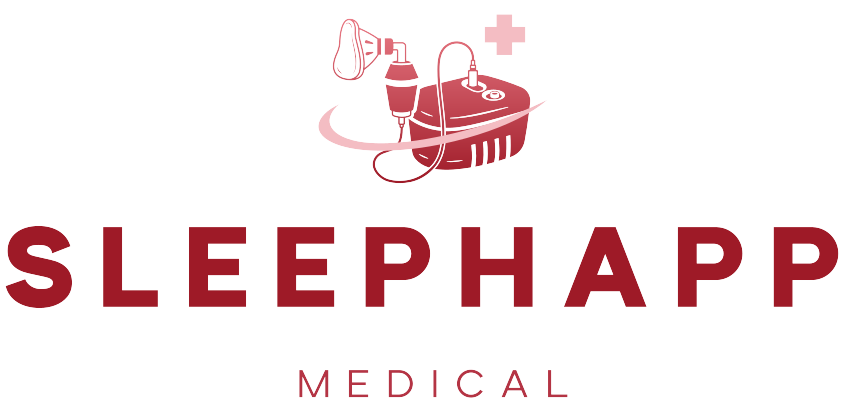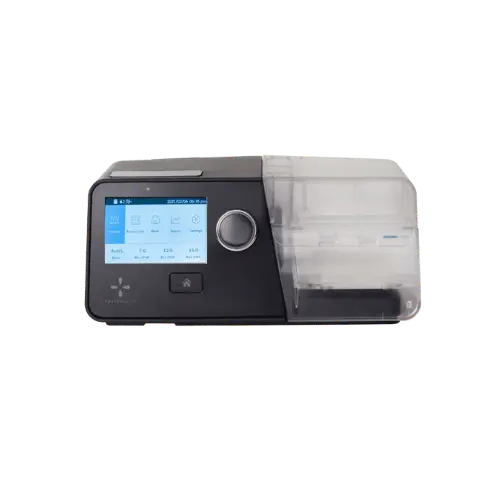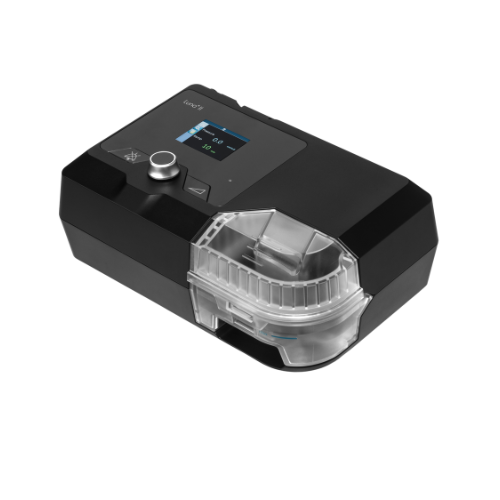What Is APAP And How Does It Work?
Home » What Is APAP And How Does It Work?

Table of Contents
What is APAP?
Automatic Positive Airway Pressure (APAP) is a type of non-invasive ventilatory support used primarily for patients with obstructive sleep apnea (OSA).
Someone who suffers from sleep apnea either pauses and starts again during sleep or their breathing becomes shallow. Usually, the first treatment your doctor could recommend is a gadget to keep a positive airway pressure.
There are three main types of positive airway pressure therapy:
- CPAP: Continuous positive airway pressure
- APAP: Automatic positive airway pressure
- BPAP: Bilevel, or variable positive airway pressure
These PAP therapies are typically delivered through a machine or device. This machine is connected to a mask via a tube, which the sleep apnea patient wears to receive the air generated by the device. These gadgets circulate air into the lungs and prevent the throat from closing during sleep.
In this article we’ll be discussing Automatic positive airway pressure (APAP).
How does APAP work?
An APAP machine pulls air through a filter and uses a motor to blow it through a tube into a mask. Like a CPAP machine, an APAP machine keeps the user’s airway open during sleep, but it works differently. The APAP device uses advanced sensors to detect breathing problems and automatically increases the air pressure. When the sleeper’s breathing returns to normal, the APAP machine lowers the pressure to the minimum level needed.
APAP devices are usually quieter and smaller than CPAP machines. They may also be a better option for those who have trouble with pressure.
Why use an APAP machine?
Using an APAP machine to treat obstructive sleep apnea may provide some advantages over other types of PAP therapy.
- In-home titration: While setting up BiPAP and fixed-level CPAP devices often requires an overnight stay in a sleep lab, the settings for an APAP device can be determined at home using the machine’s auto-adjusting feature.
- Reduced average air pressure: Some people find it uncomfortable to exhale against the constant pressure of a fixed-level CPAP machine. In contrast, an APAP machine provides air at a lower average pressure throughout the night, which can make it easier for some users to tolerate.
- Adjusting to users needs: An APAP machine’s ability to automatically adjust air pressure can benefit a person as their needs change over time. For example, factors such as drinking alcohol, gaining or losing weight, and changing sleep positions can all affect the pressure level a sleeper requires from their PAP machine.
Benefits of Using an APAP Machine
APAP machines adjust to natural breathing patterns, providing effective pressure for restful sleep and adapting to changes in position, health, or weight. They reduce the feeling of claustrophobia compared to CPAP machines, benefit users with allergies or colds, and often track data for medical monitoring, leading to less fatigue and improved productivity.
Short-Term Benefits
The primary benefit of CPAP therapy is its effectiveness in minimizing breathing interruptions during sleep. This leads to several short-term benefits, including:
- Enhanced sleep quality, leaving you feeling more rested.
- Decreased snoring.
- Reduced daytime sleepiness (hypersomnia).
- Improved mood.
Long-Term Benefits
Over time, consistent use of a CPAP machine can result in significant long-term benefits, such as:
- Better blood pressure control.
- A lowered risk of cardiovascular issues, including heart attacks and strokes.
- Enhanced cognitive function, leading to improved memory and thinking abilities.
The Regular use of a CPAP machine not only improves your immediate sleep experience but also contributes to better overall health in the long run.
When should you avoid using the APAP machine?
These complex machines use algorithms to continuously calibrate the pressure required to prevent your upper airway from collapsing. While they can be expensive, your insurance plan may not cover the cost.
- Apnea type: APAP has not been well studied with people who have central sleep apnea syndrome. It happens because of faulty signals from your brain to the muscles that control your breathing. The more common obstructive sleep apnea occurs when something blocks your upper airway.
- Health problems: If you have heart failure, chronic obstructive pulmonary disease (COPD), or if your breathing issues follow from obesity or opiate use, you might not be suitable for APAP.
- Leaks: Your APAP may not work if your mask fits poorly or the seal isn’t tight enough. This can be a problem, especially if you move a lot during sleep or have high air pressure.
Most of these problems are minor and can be easily fixed by trying a different mask type, cleaning the PAP machine, using a humidifier, or using nasal saltwater spray.
Key steps to use APAP machine
APAP comes with a mask that you wear over your mouth. It’s connected to a small device gently pushing air into your throat.
If your sleep apnea is uncomplicated, you can start using your APAP immediately after your doctor diagnoses you without visiting a sleep center first.
After your training, make sure you’re confident that you know how to use your APAP. Your checklist may include:
- Fitting: Do check the fitting of the mask before you start using the APAP machine.
- Check for Leaks: Tell your doctor if the mask doesn’t stay on or leaks air.
- Adapt: Give yourself time to get used to it and the changing air pressure.
- Consultation: Consult your doctor if it’s a good idea to track your symptoms to see how much APAP helps.
What Is an APAP Machine Used For?
An APAP machine is used to treat sleep apnea, a condition where breathing becomes shallow or stops altogether during sleep.
Obstructive Sleep Apnea (OSA):
Obstructive sleep apnea occurs when the muscles that support the soft tissues in your throat, such as your tongue and soft palate, temporarily relax. When these muscles relax, your airway is narrowed or closed, and breathing is momentarily cut off.
Several factors can contribute to obstructive sleep apnea, including:
- Advancing age
- Higher body mass index (BMI)
- Sex
- Head and neck anatomy
- Sleeping position
- Substance use
- Underlying medical conditions
Central Sleep Apnea (CSA):
Central sleep apnea (CSA) is a disorder in which breathing stops and starts repeatedly during sleep. In some cases, breathing is very shallow. Central sleep apnea occurs because the brain doesn’t send proper signals to the muscles that control breathing.
Factors that can increase the risk of CSA include:
- Age
- Sex
- Certain medications
- Ascending to high altitudes
APAP machines are designed to respond to changes in breathing patterns. They help prevent interruptions that could reduce sleep quality or pose a risk to the sleeper’s health.
How Does an APAP Machine Adjust to Your Breathing?
APAP machines use sensors to measure breathing resistance. A computerized algorithm adjusts the airflow based on these measurements. Since algorithms differ between manufacturers, it’s important to compare them before buying.
Some machines use a more aggressive algorithm, keeping the air pressure at the treatment level longer before dropping to the minimum. Others increase air pressure slowly and decrease it quickly after reaching the treatment level. This approach can be more comfortable for the user but may be less effective for certain cases of sleep apnea.
Where Can You Buy an APAP Machine Online?
You can buy an APAP machine online from various reputable sources. Major medical supply retailers, such as
- Sleep Happ: An authorized dealer offering a wide range of APAP machines with user-friendly features.
- React Health: A manufacturer known for innovative APAP and CPAP solutions that enhance comfort and compliance.
- Resmed: A leading manufacturer of high-quality APAP and CPAP machines that adapt to individual breathing patterns.
- CPAP Supplies: An authorized dealer specializing in various CPAP and APAP products to meet your needs.
Few Best APAP Machines
Final Thoughts
APAP machines offer a flexible and comfortable solution for treating obstructive sleep apnea by automatically adjusting air pressure to meet individual needs throughout the night. While they present advantages such as in-home titration and reduced average pressure, users should consider potential drawbacks like cost, suitability for specific apnea types, and equipment fit. Overall, APAP represents a valuable option for many patients seeking effective sleep apnea management.
SEE OUR SLEEPHAPP MEDICAL PRODUCTS!


